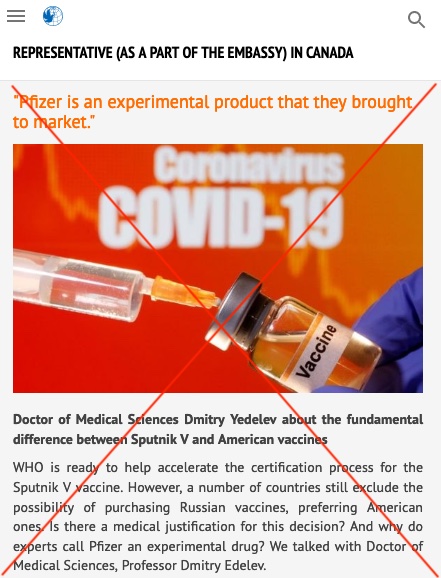The Russian government’s compatriot program has published false information about the Pfizer vaccine, intended to sow doubts about it and provoke vaccine hesitancy on the website of the Russian Embassy in Canada.
In a piece titled “Pfizer is an experimental product that they brought to market,” a person identified as a Russian doctor claims that the Sputnik V vaccine – developed by the Russian government – is superior to others. The doctor falsely claims that the Pfizer COVID vaccine “has never been tested in humans. We can say that this is an experimental vaccine, the creators decided to train in humans after cats and dogs.”
The Russian Embassy in Canada makes the clearly false statement that “this technology is absolutely experimental in relation to people, unlike the Sputnik V vaccine.”
The Pfizer COVID vaccine, and all other vaccines approved by Health Canada, are not experimental and have all undergone standardized testing, which is required for any drug or vaccination before receiving government approval. Health Canada first approved the Pfizer COVID vaccine on December 9, 2020. On May 5, 2021, Health Canada expanded its approval to include anyone aged 12-15. The Pfizer vaccine has been approved for use in 85 countries world-wide.
Disinformation about vaccine safety published by the Russian government is intended to provoke vaccine hesitancy in Canadians and promote Russian vaccines. The Chinese government has engaged in similar COVID-related disinformation campaigns. Such content contributes to COVID-related polarization within society and an erosion of trust in the measures taken to reduce the spread of COVID-19.
The European Union’s Eastern Stratcom’ EUvsDisinfo recently warned that both China and Russia have intensified their “disinformation and manipulation efforts to undermine trust in Western-made vaccines, EU institutions and Western/European vaccination strategies” in their April 2021 COVID disinformation update.
It should be noted that 64 percent of Russians refuse to take the Spunik V vaccine.


